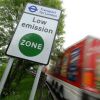The new plans, designed to improve air quality in built-up areas, will offer drivers of the most polluting vehicles ‘credits’ to spend on greener options like public transport, bicycles, electric scooters, car clubs and taxis.
The aim is to reduce car dependency in cities and lower levels of congestion and air pollution.
A trial of the scheme will reportedly launch in Coventry this spring, specifically for diesel cars built before 2016 and petrol vehicles built before 2006.
Run by the city council and the West Midlands Combined Authority – it will be funded by the government’s £22 million ‘future transport’ initiative.

RAC sale – up to 33% off*
• Roadside cover from £5.29 a month†
• We get to most breakdowns in 60 mins or less
• Our patrols fix 4/5 breakdowns on the spot

A figure between the allotted £1,500-£3,000 will be given to those who agree to have their old car towed away. Once the money is uploaded to a payment card, participants will be able to spend their credit on fixed options of alternative transport.
Set to last two years, the scheme will be analysed to assess the cash sum needed to achieve a long-term change in travel usage. It’s hoped that taxpayer contributions would eventually be replaced by long-term funding from private companies.
Andy Street, the West Midlands Mayor, said: “We have a number of candidates lined up in Coventry following a public appeal for volunteers last year and are putting processes in place to allow them to scrap their old cars in exchange for transport credits later this spring.”
- Low Emission Zones: what you need to know
- Euro 1 to Euro 6 guide – find out your vehicle’s emissions standard
- 11 ways to reduce your driving emissions
A similar programme could be implemented in Hampshire, where the country council is contemplating a ‘mobility credit scheme’ for residents who agree to wave goodbye to their car.
Before figures dropped dramatically in 2020 due to the pandemic, Department for Transport figures show vehicles collectively covered 356.5 billion miles on British roads in 2019 – an increase of almost 11% in five years and 36% since the mid-1990s.
RAC head of roads policy Nicholas Lyes said: “While this is a well-intentioned move to reduce car use and improve air quality, we know that since the pandemic drivers are attaching more, not less importance to having access to a vehicle. A scheme like this will inevitably work for some people, but we suspect the numbers may not be as great as policymakers might like.
“The success of schemes like this depends on the public’s confidence in the affordability, reliability and convenience of the alternative forms of transport available to them. Our research shows a majority don’t see public transport as suiting their needs and therefore may be loath to give up their vehicles altogether. For these people, a switch to an electric car is perhaps the preferred option when they’re in a position to do so.”
Get 30 driving tips that will save you money
Running a car isn’t cheap, but there are some easy things you can do to keep your costs down. Get these tips and more useful driving articles sent straight to your inbox now.















